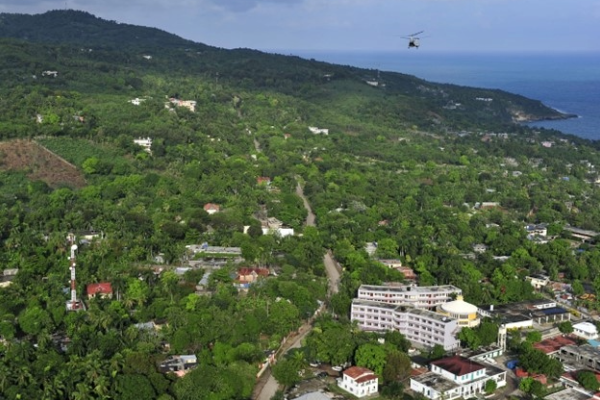Human Rights in Latin America: A Brief Look at Current Human Trafficking Concerns in Haiti

Amid the current conflict between violent gangs in Haiti, who now control approximately 80% of the capital of Port-au-Prince, and the country’s transitional government, cases of human trafficking have been growing; especially accounts of the worst forms of child labor in the areas of commercial sexual exploitation and the use of child soldiers by gangs.
In addition, concerns have continued to grow regarding a system of child domestic servitude referred to in Creole as restavek, which was already known to be a prevalent form of trafficking prior to the start of the current conflict. It is estimated that somewhere between 150,000 to 300,000 children are currently living in conditions of restavek.
The spike in trafficking comes amid ongoing gang violence on the island since the early months of 2024. Cases have continued to grow ever since the initiation of a security mission backed by the United Nations deployed to the country, which prompted gangs to recruit child soldiers for use in face of increased law enforcement presence and clashes.
According to a report by Human Rights Watch, the recruitment of children into gangs has been driven by the ever-growing humanitarian crisis and the conditions of famine children are experiencing. Gangs recruit children by offering clothes, food, and pay in exchange for service. Approximately 5.4 million Haitians currently face acute hunger, with many experiencing levels of famine in certain areas. The International Organization for Migration (IOM) reports also, in their most recent situation report, that over 700,000 Haitians currently face internal displacement. Such conditions may mean that, for children, joining a gang is a means of survival.
Children worked as informants setting up checkpoints, running errands, and procuring supplies for gangs. Human Rights Watch reported that children were trained, given guns, and deployed in skirmishes within weeks or months of joining.
Girls have faced both domestic exploitations, being forced to cook, clean, and perform other household tasks within the homes of gang members. Additionally, women and girls have faced high rates of sexual exploitation and violence by gang members. Statistics from the UN Office for the Coordination of Humanitarian Affairs indicate that 94% of women and girls are at risk for gender-based violence, and that 72% of reported instances involved sexual violence.
These instances of trafficking among Haitians do not just remain limited to the country. The dire conditions have forced many to leave their homes, with thousands fleering to the bordering Dominican Republic. With regards to human trafficking, this trend proves worrisome given the history and ongoing problem of Haitian immigrants being trafficked into labor within the country or deported back to dangerous conditions in Haiti.
In the 2024 U.S. State Department Trafficking in Persons Report, a lack of protection for Haitian immigrants from trafficking, and failure to prosecute traffickers of Haitians, were cited as a core reason for identifying the Dominican Republic as a Tier 2 (Watch List) nation; this indicates that the country has not made sufficient steps, in the eyes of the U.S., to address trafficking given the rate at which it is occurring in the country.
Dominican President Luis Abinader has proven to be hard on the immigration of Haitians, with over 250,000 having been deported in 2023 alone. This, and the administration’s goal to expel 10,000 Haitian migrants weekly back to the other side of the island has drawn criticism, with many saying that the goal is entrenched in historic racism against Haitians and others of Afro-Caribbeans that has existed within the Dominican Republic. The actions have also falsely targeted Black Dominicans and those born in the country with Haitian descent.
Others have gone to a variety of mainland countries including the U.S. However, migrants have faced continued hostility from these nations, with deportations back to Haiti continuing to occur in the U.S., and a mass deportation effort launched by the Dominican government.
These actions have resulted in immense backlash from the international community, and the UN in particular, for forcing people into dangerous and deplorable conditions. Calls have arisen for the U.S. to grant Haitians Temporary Protected Status(TPS) and for both countries to stop deportations of Haitians.
Recommendations by multiple international actors including the U.S. State Department and the United Nations have focused on reestablishing order and control within Port-au-Prince, and reclaiming areas currently under gang control. Efforts have been underway, with a UN-approved multinational security support mission headed by Kenya materializing in June and July of 2024 with 400 officers, and more being promised in September.
The 2024 Trafficking in Persons Report emphasized the importance of the Haitian government in strengthening efforts to improve social welfare protocol and law enforcement that contribute towards trafficking prevention; an effort that previously lacked the necessary logistics, staffing, and funding according to Human Rights Watch. Even now, the organization says, the international response has not been enough to adequately address the levels of trafficking occurring in Haiti.
International leaders and human rights advocates remain cautiously optimistic that, following reapproval for the UN security mission to remain in place through 2025, with increased international funding and national security, a stronger framework and action for preventing human trafficking within Haiti is possible.
